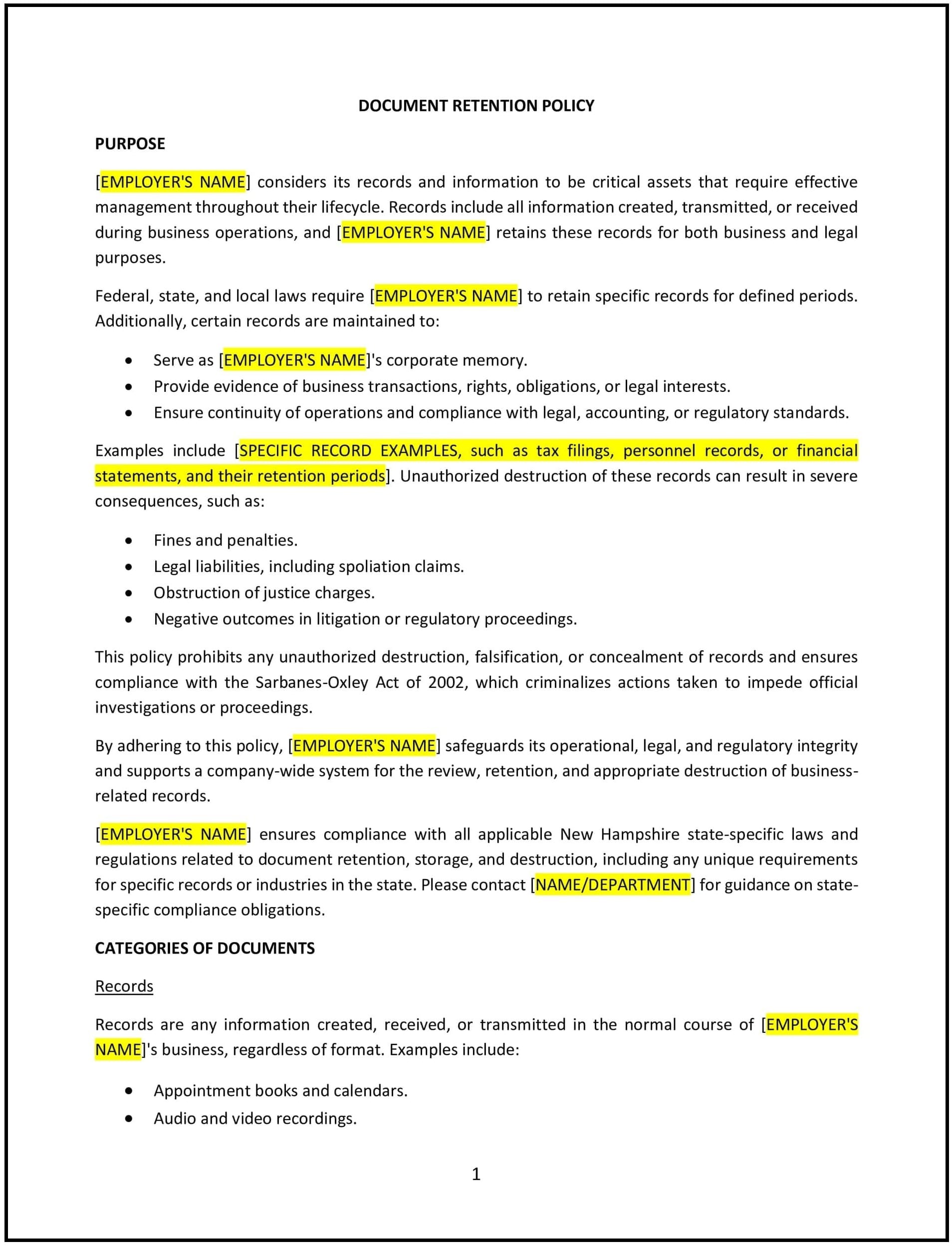Got contracts to review? While you're here for policies, let Cobrief make contract review effortless—start your free review now.

Customize this template for free
Document retention policy (Nevada)
This document retention policy is designed to help Nevada businesses manage the retention, storage, and disposal of business records and documents. It outlines the types of documents that need to be retained, the retention periods for different categories, and the procedures for securely disposing of documents when they are no longer required.
By adopting this policy, businesses can improve compliance with state and federal regulations, reduce legal risks, improve record-keeping practices, and protect sensitive information.
How to use this document retention policy (Nevada)
- Define types of documents: Clearly define the categories of documents covered by this policy, such as financial records, employee records, contracts, tax documents, and correspondence. Specify any documents that are exempt from the policy.
- Set retention periods: Outline how long each category of document must be retained. Retention periods should be based on legal, regulatory, and business requirements. For example, financial records may need to be kept for seven years, while tax returns may require retention for at least three years.
- Establish storage guidelines: Specify where documents should be stored, such as physical storage for paper records or digital storage for electronic records. Establish guidelines for how documents should be organized, labeled, and cataloged to facilitate retrieval and compliance.
- Define secure disposal procedures: Provide procedures for securely disposing of documents once they are no longer needed, including shredding paper records and permanently deleting electronic files. Ensure that sensitive or confidential documents are destroyed in a way that prevents unauthorized access.
- Ensure legal compliance: Make sure the policy complies with Nevada state laws and federal regulations, including industry-specific requirements for document retention and disposal. Ensure that employees understand which records are subject to legal holds (e.g., during litigation or audits).
- Assign responsibilities: Specify who is responsible for implementing and enforcing the policy, such as the compliance officer, department managers, or designated personnel. Ensure that employees know who to contact for questions or issues regarding document retention.
- Promote periodic reviews: Regularly review the document retention policy to ensure it remains aligned with changes in regulations, business needs, and technology advancements.
Benefits of using this document retention policy (Nevada)
This policy provides several key benefits for Nevada businesses:
- Strengthens legal compliance: Helps businesses comply with legal and regulatory requirements regarding document retention, reducing the risk of legal penalties or fines.
- Reduces clutter and storage costs: By establishing clear guidelines for document retention and disposal, businesses can minimize physical and digital clutter and reduce storage costs.
- Protects sensitive information: Establishes guidelines for securely disposing of sensitive or confidential documents, reducing the risk of unauthorized access or data breaches.
- Improves efficiency: Clear document management procedures streamline the process of retrieving and storing records, improving operational efficiency.
- Enhances security: Ensures that all records are stored securely and that sensitive information is appropriately protected from unauthorized access.
Tips for using this document retention policy (Nevada)
- Communicate the policy clearly: Ensure that all employees are familiar with the document retention policy and understand their responsibilities for storing, organizing, and disposing of records.
- Regularly update the policy: Periodically review and update the policy to ensure compliance with changing laws, regulations, or business needs.
- Implement digital solutions: Consider using document management software or cloud storage to make it easier to manage, retrieve, and securely dispose of electronic records.
- Assign oversight: Designate a responsible individual or team to oversee the implementation of the policy, ensuring that employees adhere to retention schedules and disposal procedures.
- Keep employees informed: Provide ongoing training and resources to ensure that employees understand the importance of document retention and the proper procedures for compliance.